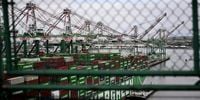Nvidia's CEO Jen-Sen Huang recently shared his concerns about the potential loss of the Chinese artificial intelligence (AI) market, which is projected to reach approximately $50 billion (44 billion euros) in the next two to three years. The ongoing tariff dispute between the United States and China could severely impact Nvidia, the American graphics processor manufacturer, as escalating trade restrictions threaten to cut off access to this lucrative market.
According to CNBC, the loss of the Chinese AI market would represent a "huge setback" for Nvidia. Huang emphasized that free trade with China could generate revenue, taxes, and many jobs in the U.S. However, the Trump administration had previously imposed restrictions that prevented Nvidia from exporting its chips to China without a license, resulting in a significant financial burden of $5.5 billion for the company in the recent quarter.
Currently, both the U.S. and China are imposing heavy tariffs on each other's goods, with the U.S. government levying tariffs of 145 percent on Chinese imports, while China retaliates with additional charges of 125 percent. This trade war not only affects Nvidia but also has implications for the broader tech industry.
In 2024, Nvidia achieved remarkable financial success, reporting a turnover of €125.40 billion, a staggering 127 percent increase from the previous year. The company's net profit reached $72.9 billion (approximately €64.5 billion), allowing Nvidia to retain more than half of its revenue as profit. This impressive performance has made Nvidia one of the most valuable companies globally, with a market capitalization of $2.77 trillion.
Nvidia's headquarters is located in Santa Clara, California, and its client base includes major U.S. tech firms. However, the ongoing trade tensions could jeopardize this success, prompting concerns among investors and industry experts alike.
In another sector, the global automotive industry is grappling with the repercussions of the COVID-19 pandemic and the fallout from trade wars, particularly those initiated by former President Donald Trump. The automotive sector has faced numerous challenges, including factory shutdowns and severe supply chain disruptions, notably due to a shortage of semiconductor chips. This chip shortage has allowed manufacturers to focus on producing only the most profitable vehicles, consequently driving prices higher.
In recent months, the European Union has imposed tariffs on new Chinese electric cars, while the U.S. has engaged in a broader trade war affecting multiple countries. As a result, many automakers are struggling to predict how Trump's fluctuating tariff policies will impact their profits for 2025. For instance, Mercedes-Benz warned that if Trump's tariffs remain, profit margins in its automotive business could decrease by three percentage points.
General Motors has projected potential tariffs could cost the company up to $5 billion, while Ford anticipates a loss of approximately $1.5 billion in adjusted earnings before interest and taxes due to these tariffs. Meanwhile, Aston Martin, a smaller luxury car manufacturer, has reduced its exports to the U.S. and is relying on existing inventory to last until early June.
The uncertainty surrounding trade policies has led some automakers to withdraw their profit forecasts for the upcoming year. Volkswagen, unlike its competitors Stellantis and Mercedes-Benz, initially provided a profit target but later retracted it, as it failed to account for the impact of U.S. tariffs.
The Tesla board recently denied a report from the Wall Street Journal suggesting that the company was seeking a successor for CEO Elon Musk, whose leadership style has drawn mixed reactions. Despite being a key figure in Tesla's growth, Musk's controversial political views have alienated some of the company's liberal customer base. In April, Tesla's sales figures in several European countries, including Spain, France, Germany, and the U.K., declined, raising concerns about the company's future performance.
Volvo Cars, one of the European automakers most affected by Trump's tariffs on U.S. auto imports, announced a cost-cutting plan and restructuring of its U.S. operations, alongside retracting its profit forecast. CEO Hakan Samuelsson, who recently returned to the company, faces the challenge of appealing to both U.S. consumers with fossil fuel and hybrid models while attracting Chinese buyers with innovative electric vehicles.
In a recent development, the U.S. House of Representatives voted to block California's plan to end the sale of gasoline-powered vehicles by 2035, a regulation adopted by 11 other states. This move has sparked a new debate between the federal government and California, with the latter arguing that the regulations are essential for reducing pollution. The outcome of this legislative battle remains uncertain.
As the automotive industry navigates these turbulent waters, several key players are making strategic moves. Alphabet's self-driving unit, Waymo, plans to manufacture Jaguar I-PACE and Zeekr vehicles equipped with its autonomous technology in a new factory in Arizona later this year. Onsemi has projected second-quarter revenue that exceeds Wall Street expectations due to sustained demand for its chips used in electric vehicles, despite the ongoing tariffs.
Rivian, the electric vehicle manufacturer, is set to invest $120 million in a supplier park near its factory in Illinois, preparing for the launch of a smaller, more affordable SUV next year. Meanwhile, Novo Energy, Volvo's battery company, will reduce its workforce by 50 percent to cut costs after assessing the bankruptcy of Northvolt, its former co-owner.
In light of declining demand and trade-related challenges, General Motors has announced it will cut a shift at its pickup truck plant in Oshawa, Canada. As the automotive landscape continues to evolve amid these challenges, the industry remains on high alert, monitoring developments in trade policies and their potential impact on future operations.





